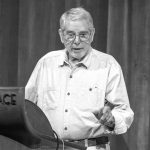An understanding of the validity of science and scientific criticism, whether about cosmology, or climatology, or physiology and the efficacy of CrossFit, requires knowledge of the terms conjecture, hypothesis, theory, and law.
Be aware, now, consensus on the meaning of these terms is fading. … In common use, scientists speak at once of probability theory and the laws of probability. Scientifically credentialed individuals advance unvalidated models by proclaiming a consensus. It’s an infection like university grade inflation. Nevertheless, here is a guideline that will improve your science literacy; give you a framework for evaluating all variety of supposedly objective or scientific claims, arguments, and models; and hold you in good stead with real scientists.
Science is all about models of the real world, whether natural (basic science) or manmade (applied science, or technology). These models are not discovered in nature, for nature has no numbers, no coordinate systems, no parameters, no equations, no logic, no predictions, neither linearity nor non-linearity, nor many of the other attributes of science. Models are man’s creations, written in the languages of science: natural language, logic, and mathematics. They are built upon the structure of a specified factual domain. The models are generally appreciated, if not actually graded, in four levels:
A conjecture is an incomplete model, or an analogy to another domain. Here are some examples of candidates for the designation:
- “Ephedrine enhances fitness.”
- “The cosmological red shift is cause by light losing energy as it travels through space.” (This is the “tired-light conjecture.”)
- “The laws of physics are constant in time and space throughout the universe.” (This one is known in geology as “uniformitarianism.”)
- “Species evolve to superior states.”
- “A carcinogen to one species will necessarily be carcinogenic to another.”
A hypothesis is a model based on all data in its specified domain, with no counterexample, and incorporating a novel prediction yet to be validated by facts. Candidates:
- “Mental aging can be delayed by applying the ‘use it or lose it’ dictum.”
- “The red shift of light is a Doppler shift.”
A theory is a hypothesis with at least one nontrivial validating datum. Candidates:
- Relativity.
- Big Bang cosmology.
- Evolution.
A law is a theory that has received validation in all possible ramifications, and to known levels of accuracy. Candidates:
- Newtonian mechanics.
- Gravity.
- Henry’s Law.
- The laws of thermodynamics.
Each of these candidates can stir arguments worthy of a paper, if not a book, and no model is secure in its position. Weak scientists will strengthen their beliefs and stances by promoting their models while demoting the competition. Some familiar models fail even to be ranked because they are beyond science, usually for want of facts. Candidates:
- Creation science or notions of “intelligent design.”
- Astrology.
- Parapsychology.
- UFO-ology.
